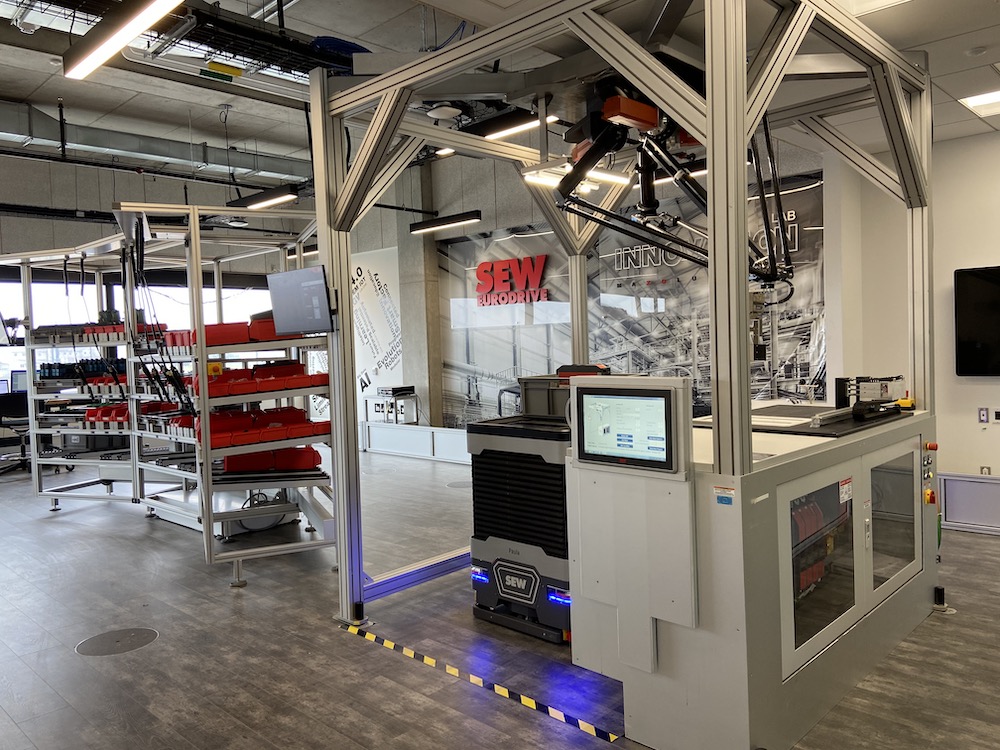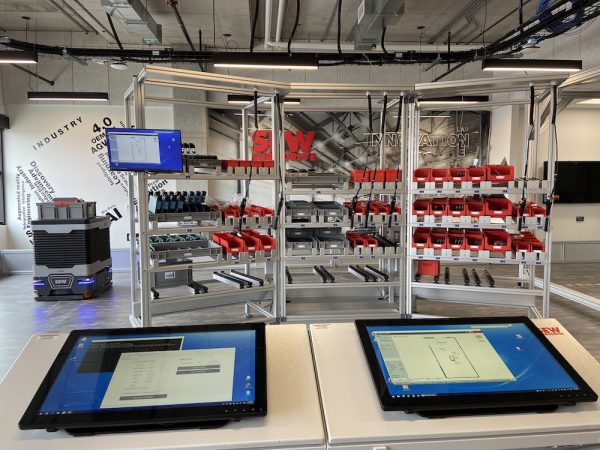
Use a testbed to enable Industry 4.0 manufacturing
June 7, 2021
By Lyall Watson
 Photo: SEW EURODRIVE/Humber College
Photo: SEW EURODRIVE/Humber College In 2017, Humber College approached SEW-EURODRIVE with a concept for the Barrett Centre for Technology Innovation.
The concept was based on creating an environment where the educational sector and advanced manufacturing industry would work together to actively develop and test applied research projects in a state-of-the-art facility.
After the partnership signing, both parties immediately went to work to create a vision for manufacturing of the future. The end result was the creation of the Ernst Blickle Innovation Lab, named for the founder of SEW-EURODRIVE.
The goal of the Innovation Lab was to showcase advanced manufacturing and Industry 4.0-ready technology that SEW-EURODRIVE is currently using in its own facilities around the world.
It also needed to have the ability to be modified and adjusted for other projects between Humber College and end users looking to upgrade their manufacturing capabilities.
The Innovation Lab emphasizes the coexistence of robots and humans, hence the term “cobots.” These cobots work alongside their human counterparts instead of replacing them. Humans perform the value part of the manufacturing, while the cobots perform the monotonous, labour-intensive or hazardous tasks.
Industry 4.0 is about interconnectivity and real-time process data transfer between all the parts of the manufacturing process/cycle.
When entering the lab, you will first see Paula and Bianca, two automated guided vehicles (AGVs) that are used as assembly assistants. The AGVs operate 24/7 without ever being taken offline to recharge as they charge on the fly using contactless inductive charging or wireless charging.
The Innovation Lab displays two of the five modular approaches to manufacturing that SEW-EURODRIVE uses at its own manufacturing and assembly centres globally – in this case, the assembly manufacturing and test manufacturing modules.
A complete process would normally include a warehouse module, a packaging module and a shipping module. The complete setup can be viewed on a video being displayed on the screen inside of the lab.
In this real and functional setup, the lab showcases the assembly of SEW-EURODRIVE’s own line of variable frequency drives, the MOVI-C, by using Industry 4.0 manufacturing concepts.
Industry 4.0 is about interconnectivity and real-time process data transfer between all the parts of the manufacturing process/cycle, from the high-level IT infrastructure such as WMS from companies like SAP or Oracle, to the factory production line between individual machines on the plant floor.
During any point in the process, the product configuration can be changed in real-time, highlighting a key benefit of Industry 4.0.
The Innovation Lab shows the process from the product configuration all the way through to the assembly of the products in the assembly module.
Once the product configuration is complete, the cobots use their LiDAR sensors along with SEW-EURODRIVE’s own guidance system to autonomously drive themselves to the different modules without any human interaction.
Once the cobot enters the assembly cell, the smart racking (pick by light LED system) will display which parts are to be picked.
Since the entire process is connected, the smart racking knows which order is being processed by the human assembler and highlights the appropriate components at the right time.
The assembler wears a Microsoft HoloLens augmented reality headset that works in real-time to show assembly instructions in the headset and guides the assembler while assembling the product.
Since the instructions are displayed step-by-step, the worker can assemble a variety of complex products during a single shift, instead of being trained to assemble the same thing over and over.
The Innovation Lab is set up to enable not just Humber College students to re-configure the lab for educational purposes, but also for real-world prototyping of manufacturing concepts with other partners and end users.
This helps the Barrett Centre for Technology Innovation fulfill its purpose of connecting industry and students by giving them real-world experience in advanced manufacturing and helping to prepare them for jobs of today and tomorrow.
_____
Lyall Watson is sales manager, Central Canada at SEW-EURODRIVE Canada, an automation provider for solutions ranging from machine automation components to full automated systems.
This article appears in the May 2021 issue of Manufacturing AUTOMATION and is part of a series giving manufacturers a look behind the walls of the Barrett Centre for Technology Innovation. For more information on the Centre, please contact askbarrettcti@humber.ca.
Advertisement
- Feds award $11.5M for Saskatchewan companies to scale up
- Poka raises $25M in funding for connected factory worker platform
